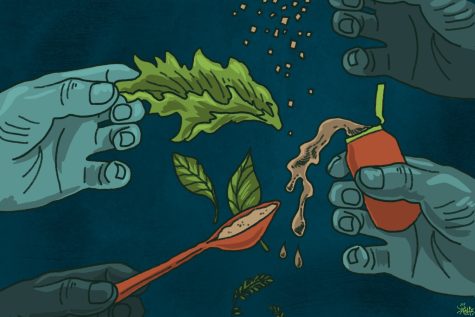Superfoods provide many delicious benefits
The Health Corner
Superfoods may not make someone fly or become invisible, but they can certainly improve one’s overall health and wellbeing.
According to Ethan Smith, a senior dietetics, food and nutrition major, a superfood is defined as a whole food product that contains phytochemicals.
Phytochemicals are non-nutritive, bioactive substances thought to contribute to health benefits beyond the basic day-to-day caloric needs, Smith said.
Phytochemicals are naturally occurring in plants and provide foods with their particular taste, aroma, texture and color, according to the American Institute for Cancer Research.
They are responsible for the bright colors of oranges and tomatoes, the spice of hot peppers and the pungency of onions, Smith said.
Superfoods include kale, salmon, whole grains, yogurt, soymilk, berries, flaxseed, spices, red wine and dark chocolate, according to the Livescience, an all-encompassing science website contributed to by expert researchers, historians and astronauts.
They are commonly referred to as functional foods because studies have shown they are beneficial to both the structure and function of the body, Smith said.
Certain superfoods contain both antioxidants and flavonoids protecting DNA and other cellular compounds from oxidative damage, according to the “NFS 043 Fundamentals of Nutrition” textbook.
Superfoods often contain lignans and organosulfur associated with reducing blood cholesterol and inhibiting cancer growth, respectively, according to the textbook.
Probiotics are also found in certain superfoods, such as yogurt, which has shown to improve overall digestion.
Studies have shown an association between the reduced risk for cardiovascular disease, Type 2 diabetes, cancer and obesity with regular consumption of these foods, the textbook stated.
Although the exact explanation for this association is unknown, nutritionists know that people who regularly consume superfoods live generally healthier lifestyles than people who do not, Smith said.
It is critical to avoid any dietary supplements that claim to provide the same beneficial components as the actual foods does in the form of convenient capsules, he said.
“Even the most promising dietary supplements fail to impart the same benefits as consuming whole foods,” Smith said. “Even worse, phytochemical-containing supplements have been shown to reduce the effectiveness of various prescription drugs”.
Although superfoods offer many benefits, it is essential to keep in mind that many headlines overstate their potential health benefits, he said.
“Eating a head of broccoli every day is a great, healthy choice, but it probably won’t cure you of your ailments,” Smith said. “Rather, individuals need a well-balanced, nutritious diet in order to do that.”
“I don’t specifically try to incorporate superfoods into my diet,” said senior Natalie Hewitt, a biological sciences major, “but I likely consume a large amount of these foods because I tend to eat a well-balanced diet to maintain my overall health.”
Burlington and UVM offer a large variety of superfoods.
“Sodexo often gets a bad rap, but they’ve done a great job at providing superfoods in many of their daily menu options,” Smith said.
It is important to look out for their plant-based meals and their Simple Servings station, offering nutritious and allergen-free options, he said.
Many of the restaurants in downtown Burlington, such as Revolution Kitchen, also serve many healthy alternatives, including whole grains, fruits, vegetables, legumes and soybean products, which improves accessibility to superfoods, Smith said.
Increase superfood consumption by eating more whole fruits, substituting dried fruit for candy, doubling non-starchy vegetable portions, integrating spices into meals and going meat-free once a week, he said.











